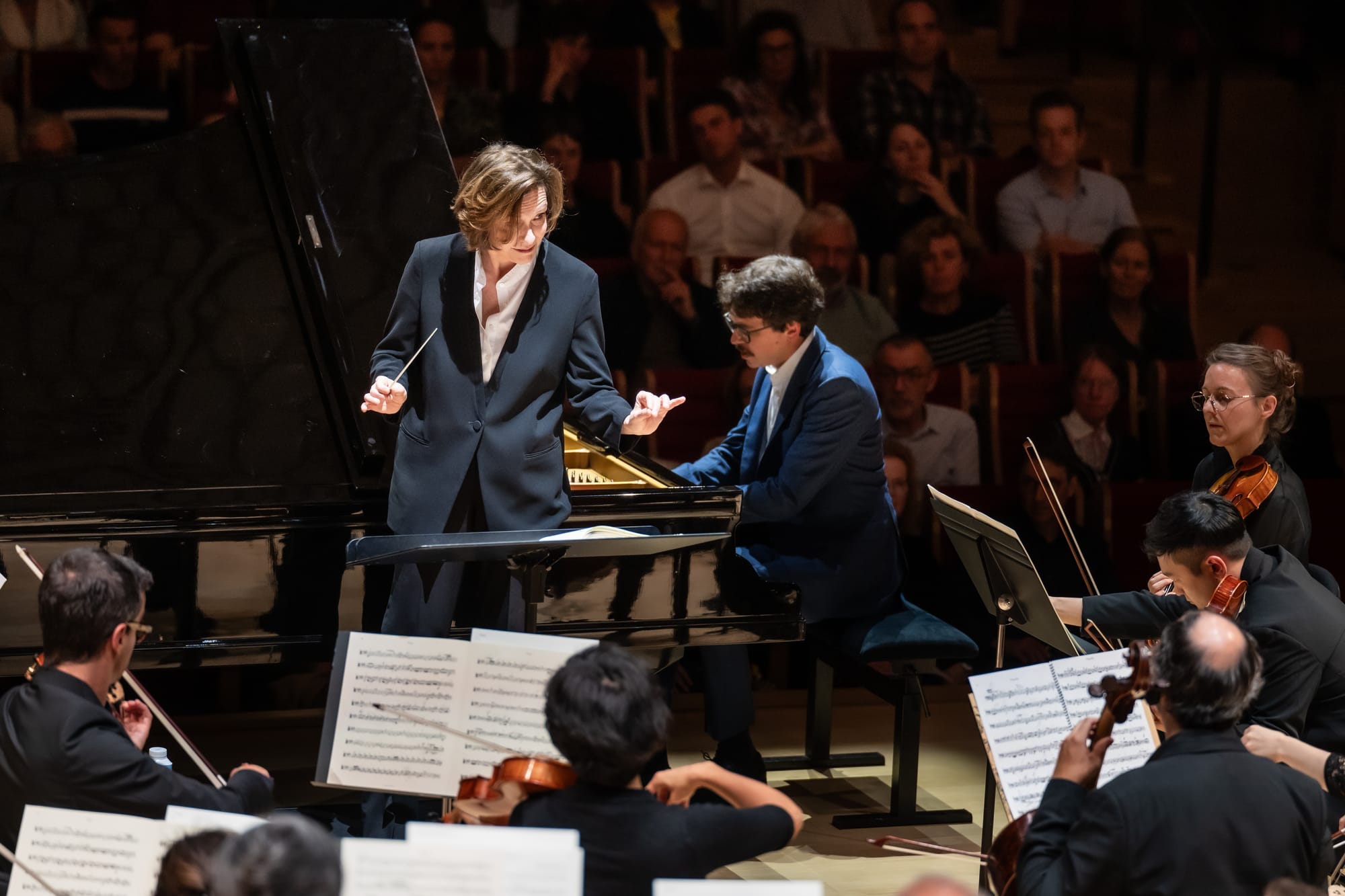
Chopin, Schumann Lucas Debargue (piano); Insula Orchestra / Laurence Equilbey (conductor). Auditorium Patrick Devedjian, La Seine Musicale, Paris, 24.09.2024
Chopin Piano Concerto No. 1 in E minor, Op. 11 (1830)
Schumann Symphony No. 4 in D minor, Op. 120 (1851 version)
In 2022, Lucas Debargue performed Beethoven’s Second Piano Concerto on a time-appropriate Pleyel. He returns with Chopin’s First Concerto, this time on a different, more muscular Pleyel from REGIE pianos, Paris,
It is in the orchestra, though, that the timbres of original instruments make their mark, the bassoons in particular nasal and with the increased transparency available, far more audible (only one phrase was buried as opposed to the usual vast swathes) In both the Chopin and the Schumann, one felt that both composers – both long criticised for their orchestrations – were vindicated.
Equilbey’s direction of the orchestral exposition of Chopin’s Op. 11 was direct and without doubt dramatic. Yet even here, inner voices revealed themselves beautifully. A pity the first horn was having an off night, but other wind solos shone.
Debargue is known as a real thinker in music: he is never one to take things as given. Here, it was a combination of Romantic sensibility with superb clarity that marked the reading: rarely has Chopin’s admiration of Bach been so audible.
Insula’s strings sounded with gossamer translucency at the opening the great Romance (a Larghetto). Contrasts were finely drawn later; this was almost a tone poem for piano and orchestra, contrasting perfectly with the joyously rhythmic finale, with its deliciously light octave lines from Debargue.
One encore: a Mazurka by Debargue (which intriguingly brought the world of Ahmet Adnan Saygun, of all people ,to mind, and his piano pieces on Aksak rhythms). A fascinating jewel.
Schumann’s Fourth Symphony was heard in its later and more familiar 1851 version (there is an1841 original). The later version tightens the musical argument, running the four movements into a continuous whole. Interestingly, opinion is split at the very highest level as to which is preferable, with one Johannes Brahms no less, siding for the earlier, and Clara Schumann opting for the later. It is worth remembering that the Fourth is actually the Second of Schumann’s symphonies (No. 2 dates from 1845/6, No. 3 from late 1850) and so imbuing the score with freshness and dynamism works to its advantage. Such was the case in Equilbey’s Fourth. The opening ‘Ziemlich langsam’ led perfectly to the first movement proper (‘Lenhaft’). Equilbey has a fine sense of Schumann’s harmonic procedures, of the way the composer gathers tension towards structural nodes. Verve and dynamism characterised the Lebhaft, the development arresting in its daring writing, trombones almost ominous in their sustained three-note cells against the more active strings.
The second movement is a ‘Romanze’ and features a violin solo, beautifully done in the fluidity of its triplets by Stéphanie Paulet; as was the oboe and solo cello moment (Jean-Marc Philippe and Damien Ventula, respectively). Equilbey understands the Scherzo’s basis of contrasts; but the first violins felt somewhat shrill in in their upper register and passagework could have benefitted from some tidying. But there is nothing but praise for the sheer beauty of the Trio and the darkening leading into the finale, the oscillating bassline seemingly hearkening back to Beethoven’s Seventh Symphony. And it was in this last movement that kinship with the First Symphony (itself nicknamed, ‘Spring’) came into play. Some fabulous, clearly carefully-prepared crescendi made their mark, but most of all this worked so well because of Equilbey’s metric control, the whole moving inevitably towards the conclusion.
One encore again, an orchestration of Schumann’s ever-popular piano piece, ‘Träumerei’ from Kinderszenen, interesting for sure, but the performance standard was lower (despite a lovely clarinet solo at the theme’s later appearance from Lorenzo Casale). Tuning was not always impeccable: sometimes it is best to leave on a high and eschew the (presumably expected) extras.
The programme booklet was interesting in its suggested further listening. While that for the Schumann Symphony was unremarkable (Brahms’ Fourth Symphony), that for the Chopin was a lovely idea: Hummel’s beautiful, and decidedly Chopinsque, Piano Concero No. 2 in A minor, Op. 85 (written in 1816 and actually in Chopin’s own repertoire). Do seek it out, and if we are keeping with the authenticist trajectory, try Alessandro Commellato on fortepiano with Didier Talpain conducting Solamenti Naturali on Brilliant Classics, a vivid and engaging performance. It is true there is significantly more padding in Hummel than in Chopin, but the rewards of the Hummel are many and real. Worth noting perhaps not to confuse Op. 85 with Hummel’s ‘other’ A Major Piano Concerto, WoO 24 (lovely though that is – Howard Shelley does a fine job with the London Mozart Players on Chandos).
However, for a YouTube performance of the Hummel. let’s take a very topical Stephen Hough with the English Chamber Orchestra and Bryden Thompson (topical as Hough played the Grieg just last night – October 26, 2024 – at the Festival Hall. Expect a report!):
A fabulous start to Insula’s season. The programme is repeated in Wrocław, Poland, on Sunday, September 29.
The Hummel on Brilliant Classics is available at a snip (£5.94) on Amazon here.






